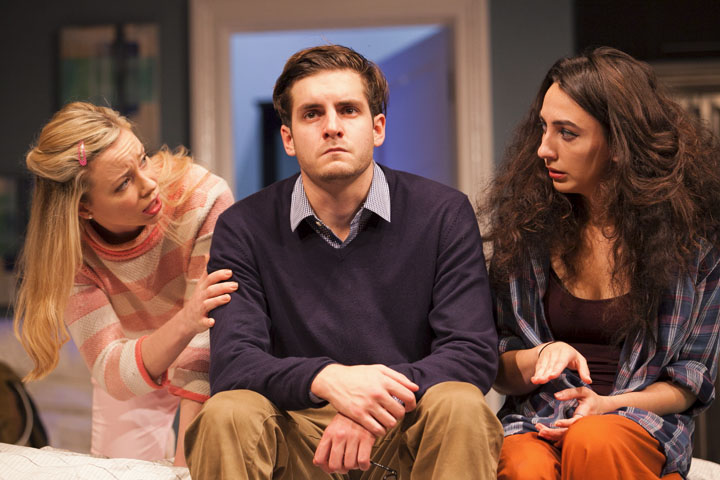I originally reviewed this play on its first UK run at the Ustinov in Bath and you can find my thoughts here. Now back after a successful run in the West End and with a new cast this is not a reassessment but a fresh review.
The title contains neither a question nor an exclamation mark. It is apparently a bald statement of fact. But that won’t do for a play, which in fact is an exploration of both punctuation marks. It takes the uncontroversial course of having the debate (‘What is a good Jew?’), not between Jew and non-Jew, but as a familial, internecine scrap over Jewish identity. None of this, however, lends itself to an anodyne treatment of the subject and if anything (without referring to my previous notes) this cast is even more uncomfortably visceral in its working out of what is, to be sure, an age old dilemma. After all these are questions that we all ask; ‘How do we define ourselves in terms of our allegiances?’ ‘To what do I belong?’ These are matters, which at the beginning of the twenty first century, are for many, urgent and troubling questions.
The two antagonists at the centre of the play are Jewish cousins, Daphna and Liam. Daphna wears her Jewishness on her sleeve and for her, though having been brought up as a traditional American girl, it has become central to her sense of identity. Cousin Liam, an ‘atheist Jew’, has come to New York, like Daphna, for the funeral of their grandfather, though he missed the actual service – a source of much vitriol from Daphna. The two are soon at loggerheads over the ownership of a deeply symbolic heirloom left by the grandfather, a gold medallion that he had hidden from the guards during his time in a Nazi concentration camp. For her it is a token of Jewish identity, for him one of family identity and love.
Part of the success of the play, as a piece of theatre, is the paradox that the more excoriating the dialogue the funnier it becomes, precisely because of the absurdity that lies at the heart of the matter.
A similar, comical, paradox arises as the veils that divide communities grow thinner the tenacity of our need to belong, to identify, becomes stronger. In the case of some Jews, this is expressed by the negative ploy of calling attention to what they are not doing by way of observance. Surely Puck’s comment on this ‘fond pageant’ has it aright,
‘Lord, what fools these mortals be!’
Harmon is fearless in his treatment of the subject and gives both characters full rein to go for the other’s jugular. Ailsa Joy as the fervent Daphna, now politely rude, now offensively confrontational, breathes righteous fire into the character. Daniel Boyd as her easily wound up cousin, equally gives a good account of the opposing view before tipping, very convincingly, into Basil Fawlty style apoplexy. Antonia Kinlay as Liam’s girlfriend, the extremely non-Jewish, good-hearted Melody, finds a way to give us Barbie with a soul. Jos Slovick as Jonah, succeeds in the difficult task of saying little, whilst delivering the emotional punch-line at the end.
Undoubtedly deserving of its plaudits the play sparkles with rich characters and scintillating, raw dialogue, which entertains and amuses as it provokes. It could indeed, stand as a metaphor for society as a whole– are we not after all, in the broadest sense the members of the same family? ★★★★☆ Graham Wyles 9th October 2015 at Bath Theatre Royal
Photo by Nick Spratling


